The press regulator has dismissed out of hand multiple spurious claims of “harassment”, “bias” and “inaccuracies” by Ceredigion County Council and its chief executive, Eifion Evans, as they tried and failed to take on the Cambrian News over stories detailing the public’s and councillors’ view of the authority.
The council and Mr Evans used taxpayers’ money to launch a complaint to press regulator IPSO over coverage of the authority in the Cambrian News after they falsely believed that seven articles were “inaccurate”, “bias” and constituted “harassment”.
Dismissing all the claims in its judgement, IPSO said that none of the articles that Mr Evans and the council complained about “raise a possible breach of the Editor’s Code harassment”.
Mr Evans and the council raised a complaint about a story on a report about a behind closed doors meeting with councillors over access to officers following public rows at committee meetings attended by the Cambrian News.
They complained that the story, published on 13 September, was inaccurate because its headline was ‘incorrect and not a true record of what took place’ and that it was inaccurate to report that a ‘dressing down’ took place at the meeting.
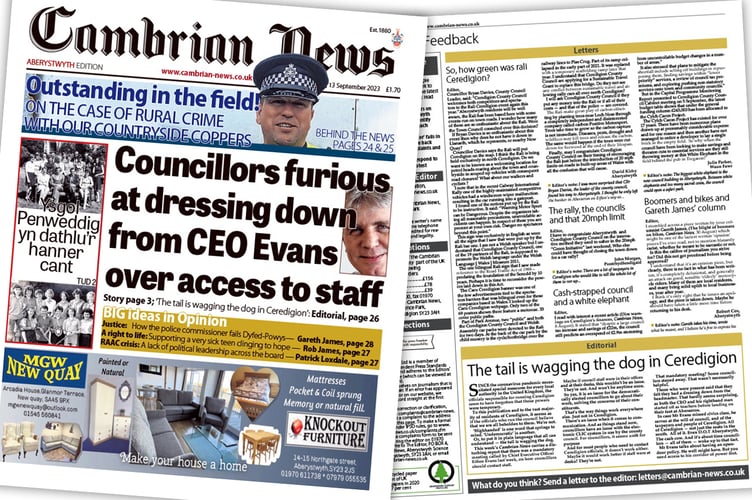
The same complaint was made of over an editorial on the same story printed in the same edition.
“We considered that the articles provided the basis for the claim that councillors were ‘dressed down’, where they reported the views of councillors in the meeting - and distinguished these views as such,” IPSO said.
“We did not therefore consider either article to be inaccurate or misleading in the manner you suggested.”
Complaints of accuracy over the headline and whether Mr Evans had called the meeting referenced in the story were also dismissed.
A story regarding the ongoing trouble at Aberystwyth Marina, published on 20 September, which referenced the amount owed to Ceredigion County Council from the collapse of the company and mentioned the salary of Mr Evans, was complained about for the figures being “completely unlinked.”
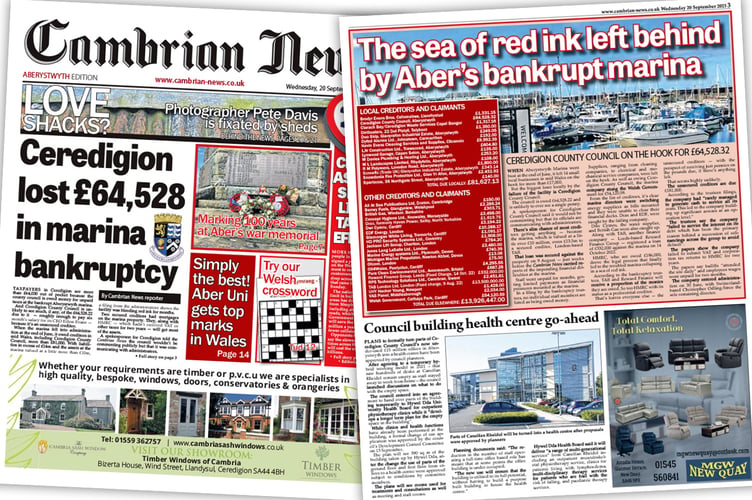
IPSO said that “newspapers have the right to choose which pieces of information they publish” and noted that neither the council nor Mr Evans “dispute that article accurately reported the money owed to the council by Marine Group, and the portion of Mr Evans’s salary this constituted.”
An article published on 27 September reported on a survey of residents which criticised Ceredigion County Council’s Gold Command set up during the pandemic.

Mr Evans and the council again complained unsuccessfully that the article was inaccurate.
“We did not consider the article to be inaccurate or misleading,” IPSO said.
“We also noted that the article in question reported on a survey which was critical of the system, and was entitled to report this response.”
The fifth complaint was made over an Editor’s note at the foot of a letter sent in by one our readers on the issue of the new 20mph speed limits which “it is but the latest example of a council that is lacking in leadership and direction.”
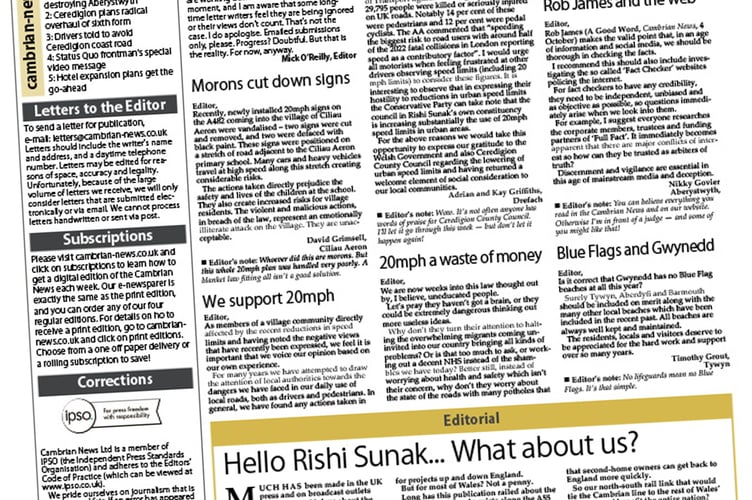
The comment, published on 11 October, was “inaccurate”, Mr Evans and the council argued, because the authority “continued to receive excellent regulatory reports from Care Inspectorate”.
“In this instance, the opinions reported were clearly presented as comment, and attributed to the publication,” IPSO ruled.
“We recognised that you disagreed with the opinions and views which were published; however, this did not in itself mean that the article was misleading to report them.”
An editorial story published on 25 October, which looked at the lack of funding to light up Aberystwyth’s war memorial on Remembrance Day was also targeted for complaints by the council and Mr Evans.
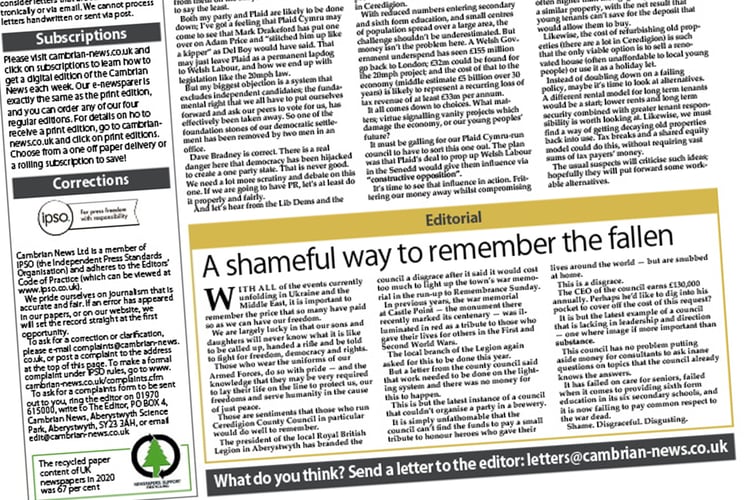
They complained over the Cambrian News reporting that it would cost the council too much to light up the monument, which IPSO found to not be significantly misleading or inaccurate.
Mr Evans and the council also had a final complaint over another Editor’s note attached to a reader’s letter, this time on bus service cuts published on 25 October.
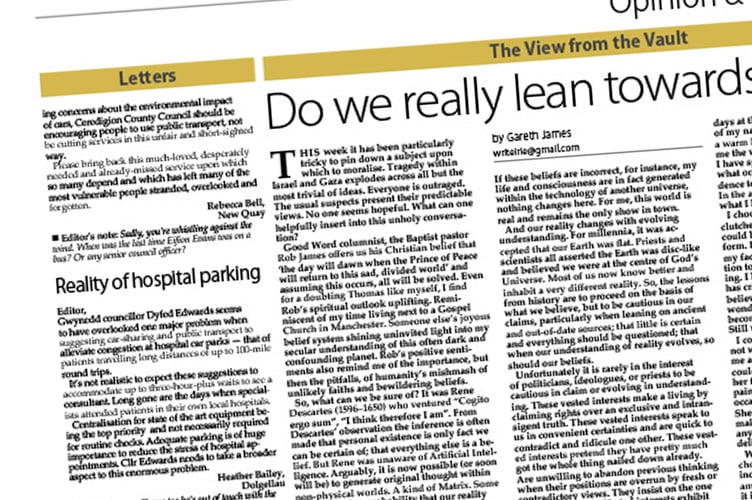
They claimed that the editor “has no way of knowing” information regarding the Mr Evans’, or other council members’, use of public transport, and that the comment “omitted information”.
Both complaints were dismissed.
Mr Evans and the council then went so far as to claim the articles as a whole breached the harassment clause because they ‘propagated’ inaccurate information, and constituted “persistent pursuit and harassment” of the council and Mr Evans specifically.
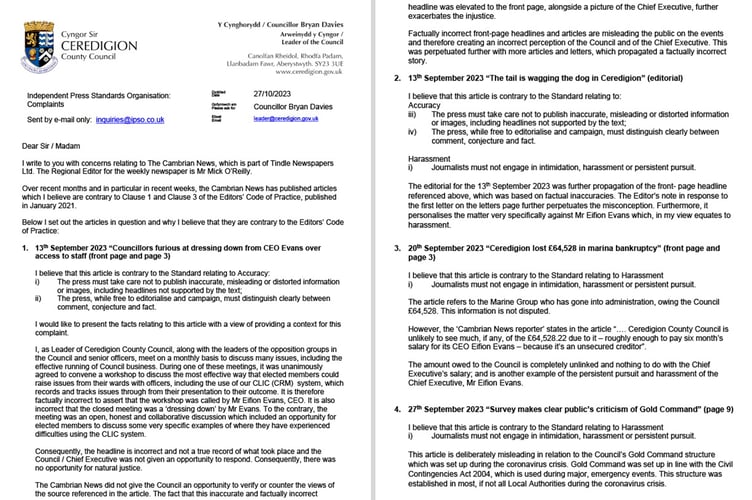
IPSO said that the harassment clause “relates to the way journalists behave when gathering news, including the nature and extent of their contacts with the subject of the story” and “does not cover critical coverage against an individual or an organisation.”
Mr Evans and the council also complained that the seven articles as a whole breached the Editor’s Code because they were “bias”.
“The Editors’ Code of Practice does not address issues of bias,” IPSO said.
“It makes clear the press has the right to be partisan, to give its own opinion and to campaign, as long as it takes care not to publish inaccurate, misleading or distorted information, and to distinguish between comment, conjecture and fact.
“You have not identified any significant inaccuracies within the articles.”
Cambrian News Editor Mick O’Reilly said that the newspaper “did not win Welsh Weekly Newspaper of the Year at the Wales Media Awards 2023 for doing nothing.”
“It believes in holding those in power to account,” he added.
“It does so without fear or favour and will continue to do so.
“I wonder how much time, effort and money were spent by Ceredigion County Council in preparing this IPSO complaint?
“Clearly it is has no concept of its role to serve all the people of Ceredigion and not just the council itself.
“If Ceredigion County Council believes making spurious claims to IPSO will divert or intimidate the Cambrian News from reporting and holding public bodies to account, then it is sadly mistaken.”
IPSO's ruling in full
Dear Mr Davies,
I write further to our earlier email regarding your complaint, on behalf of Ceredigion County Council and Mr Eifion Evans, about the following articles published by Cambrian News:
- An article headlined “Councillors furious at dressing down from CEO Evans over access to staff”, published on 13 September 2023.
- An article headlined “The tail is wagging the dog in Ceredigion”, published on 13 September 2023. This article also appeared online, under the headline “Editorial: The tail is wagging the dog in Ceredigion”.
- An article headlined “The sea of red ink left behind a of red ink left behind by Aber’s bankrupt marina”, published on 20 September 2023. This article also appeared online, under the headline “The sea of red ink left behind a of red ink left behind by Aber’s bankrupt marina”.
- An article headlined “Survey makes clear public’s criticism of Gold Command”, published on 27 September 2023. This article also appeared online, under the headline “Survey makes clear public’s criticism of Gold Command during pandemic”.
- An editorial comment attached to a reader’s letter, published on the “Letters” pages under the title “We support 20mph”, on 11 October 2023.
- An article headlined “A shameful way to remember the fallen”, published on 25 October 2023. This article also appeared online, under the headline “'A shameful way to remember the fallen'”.
- An editorial comment attached to a reader’s letter, published on the “Letters” pages under the title “Cuts to bus services”, on 25 October 2023.
When IPSO receives a complaint, the Executive staff review it first to decide whether the complaint falls within our remit, and whether it raises a possible breach of the Editors’ Code of Practice. We have read your complaint carefully, and have decided that it does not raise a possible breach of the Editors’ Code.
You believed that multiple of the articles breached Clause 1 (Accuracy) in several ways.
Firstly, you expressed concerns against many of the articles that they breached Clause 1 because they were biased. The Editors’ Code of Practice does not address issues of bias. It makes clear the press has the right to be partisan, to give its own opinion and to campaign, as long as it takes care not to publish inaccurate, misleading or distorted information, and to distinguish between comment, conjecture and fact. As this email will go on to explain, you have not identified any significant inaccuracies within the articles. Because of this, your complaint that the articles were biased did not provide sufficient grounds to investigate a possible breach of Clause 1.
You believed the first article breached Clause 1 (Accuracy) because its headline was “incorrect and not a true record of what took place” - you stated that it was inaccurate to report that a “dressing down” took place at the meeting. You also believed the second article breached Clause 1 for the same reason, where this alleged inaccuracy was included in the article’s text.
We should note that the Editors’ Code of Practice makes clear the press has the right to publish individuals’ views, as long as it takes care not to publish inaccurate, misleading or distorted information, and to distinguish between comment, conjecture and fact. We considered that the articles provided the basis for the claim that councillors were ‘dressed down’, where they reported the views of Councillors on the meeting - and distinguished these views as such. For example, the first article stated: “A MEETING called for all Ceredigion councillors by Chief Executive Eifion Evans following public rows over access to council officers has been described as “being brought in front of the headmaster”, whereas the second article reported: “Those who were present said that they felt they had a dressing down from the headmaster” (emphasis IPSO). We did not therefore consider either article to be inaccurate or misleading in the manner you suggested; and where the text of the first article cited claims that councillors felt they’d been “brought in front of the headmaster”, we considered that it provided sufficient basis for the headline claim. We did not identify grounds to investigate a possible breach of Clause 1.
You also stated that the first and second articles were inaccurate, in breach of Clause 1, to report that the workshop “was called” by Mr Evans. Clause 1 requires publications to take care not to publish inaccurate or misleading information, and to correct significantly inaccurate, misleading or distorted information. In considering this, we had regard for the wording of the meeting invite, which you previously shared with IPSO. We noted that the invite stated: “This is at the request of the Chief Executive and the 3 Group Leaders”. While we appreciated that other individuals were involved in this decision, we did not consider either article to be inaccurate or misleading to report that Mr Evans “called” the meeting. We did not identify grounds to investigate a possible breach of Clause 1 on this point.
Furthermore, you also said the first article breached Clause 1 (Accuracy) because the Council had not been contacted by the newspaper before it published this article, and it had not been given the chance to reply to the claims made about it. The Editors’ Code does not say that publications have to contact you before they publish articles – unless this is necessary in order to take care the article is accurate, or to give you the opportunity to respond to any significant inaccuracies in articles they publish. Because, as explained previously, your complaint did not give us reason to consider that the article contained any significant inaccuracies, we did not identify sufficient grounds to investigate a possible breach of Clause 1.
For more information of how the Code approaches the ‘right to reply’, you may find this blog to be useful.
Regarding the third article, you also stated that Mr Evans’ salary and the amount owed to the Council by the Marine Group were “completely unlinked”. Newspapers have the right to choose which pieces of information they publish, as long as this does not lead to a breach of the Code. In this case, where you did not appear to dispute that article accurately reported the money owed to the Council by Marine Group, and the portion of Mr Evan’s salary this constituted, we did not consider the article to be inaccurate or misleading on this point. We did not identify grounds to investigate a possible breach of Clause 1 in this regard.
We also considered your concerns regarding the fourth article, which you said misleadingly reported the Council’s Gold Command structure during the coronavirus crisis, and inaccurately suggested it was in charge of “making decisions”, but that these “delegated decision-making powers were never used”.
In considering this, we had regard for the wording of the article. The article stated that: “‘Gold Command gave Ceredigion County Council chief executive Eifion Evans and other executives the power to make decisions during the pandemic without full councillor input’”. We recognised that, in your complaint to IPSO, you stated the correct position was that “executive powers would be delegated to Senior Officers of the Council in the event of the Cabinet Members all having coronavirus at the same time”. While we noted that the article did not explain that the power was not, ultimately, used; we did not consider the article to be inaccurate or misleading where this was the power structure implemented. We also noted that the article in question reported on a survey which was critical of the system, and was entitled to report this response, irrespective for how it ultimately operated. In these circumstances, we did not consider the article to be inaccurate or misleading in the manner you suggested; we did not identify grounds to investigate a possible breach of Clause 1 on this point.
You said the sixth article breached Clause 1 where it reported an opinion of the editor on the Council – “It is but the latest example of a council that is lacking in leadership and direction […]”. You considered this inaccurate as the Council has “continued to receive excellent regulatory reports from Care Inspectorate”. The article in question was an editorial piece – an article which reported the views of the editor/publication. We should note that the Editors’ Code of Practice makes clear the press has the right to publish individuals’ views, including the views of a publication, as long as it takes care not to publish inaccurate, misleading or distorted information, and to distinguish between comment, conjecture and fact. In this instance, the opinions reported were clearly presented as comment, and attributed to the publication – the article made this clear where it appeared under the headline “Editorial”. We recognised that you disagreed with the opinions and views which were published; however, this did not in itself mean that the article was misleading to report them. Your complaint did not give us reason to consider that the article was misleading, and we did not identify sufficient grounds to investigate a possible breach of Clause 1.
You also expressed concerns against the sixth article under Clause 1 where it reported that “it [the Council] said it would cost too much to light up the town’s war memorial in the run-up to Remembrance Sunday” – you stated there was “no reference to the cost of the repairs”. In considering this, we recognised that the article stated “[the Council] said it would cost too much” – and that the Council’s response, which it supplied to IPSO, stated “Regrettably, we have recently encountered some issues with the lighting system around the war memorial which requires significant investment and upgrades” (emphasis IPSO). In these circumstances, we did not consider the article to be significantly inaccurate or misleading on this point; we did not identify sufficient grounds to investigate a possible breach of Clause 1.
Additionally, you also believed the sixth article breached Clause 1 where it also reported Mr Evans’ salary in relation to the funding needed to light the aforementioned memorial. Again, we noted that newspapers have the right to choose which pieces of information they publish, as long as this does not lead to a breach of the Code. We also recognised that the article was distinguished a comment piece, reporting the editor’s personal view regarding the council’s actions and allocation of funds. In these circumstances therefore, while we appreciated your concerns, we did not consider the article to be inaccurate or misleading on this point. We did not identify sufficient grounds to investigate a possible breach of Clause 1.
Finally, we also considered your concerns regarding the seventh article. You said the editor “has no way of knowing” information regarding the Mr Evans’, or other council members’, use of public transport. In this instance, we noted that the article was a reader’s letter accompanied by an editorial comment which reported the publication’s view – which it was entitled to do, where it was distinguished as such by the label “Editor’s Note”. We also had regard for the tone of the comment, and did not consider that it reported on their use of public transport factually. We did not identify sufficient grounds to investigate a possible breach of Clause 1 on this point.
You also stated that the seventh article may have breached the Code as the publication “has made a choice in selecting this letter for publication”, and because it omitted information regarding the funding for the Cardi Bach bus service. As noted previously, newspapers have the right to choose which pieces of information they publish, as long as this does not lead to a breach of the Code. We did not therefore consider that choosing to publish this letter – where it was clearly distinguished as a reader’s letter – was inaccurate or misleading, nor did omitting information regarding the bus funding render the article inaccurate or misleading, where it reported the reader’s personal view on the service and the council. We did not identify sufficient grounds to investigate a possible breach of Clause 1 on this point.
Moreover, you believed that many of the articles breached Clause 3 (Harassment). You said that the second, third, fourth, fifth, sixth and seventh articles breached Clause 3 (Harassment) because they ‘propagated’ inaccurate information, and constituted “persistent pursuit and harassment” of the Council and Mr Evans specifically. You also expressed concerns that the articles were biased.
While we appreciated your concerns, Clause 3 generally relates to the way journalists behave when gathering news, including the nature and extent of their contacts with the subject of the story. Where your concern did not relate to this, we did not identify grounds to investigate a possible breach of Clause 3 against any of these articles. We should also make clear that Clause 3 does not cover critical coverage against an individual or an organisation, and as noted previously, the Editors’ Code of Practice also does not address issues of bias. It makes clear the press has the right to be partisan, to give its own opinion, to campaign and be critical, provided the rights of individuals protected under the Code are not otherwise infringed.
You are entitled to request that the Executive’s decision to reject your complaint be reviewed by IPSO’s Complaints Committee. To do so you will need to email us in the next seven days, setting out the reasons why you believe the decision should be reviewed. Please note that we are unable to accept requests for review made seven days after the date of this email.
We would like to thank you for giving us the opportunity to consider the points you have raised, and have shared this correspondence with the newspaper to make it aware of your concerns.
Best wishes,
Marcus Pike




